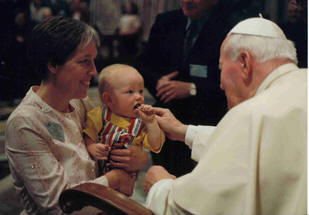Catholic Medical Quarterly Volume 64(3) August 2014
Editorial:
Saint John Paul II and the Gospel of life
Pravin Thevasathan
 Saint
John Paul's encyclical Evangelium Vitae will continue to be the definitive
magisterial teaching on life issues for decades to come. It famously
begins with a meditation on the Old Testament story of Cain and Abel. How
can I be my brother's keeper when I seek his destruction? A secularist
understanding of human rights leads us away from the Gospel of life by
proposing that the very destruction of life itself may be considered an
expression of individual choices.
Saint
John Paul's encyclical Evangelium Vitae will continue to be the definitive
magisterial teaching on life issues for decades to come. It famously
begins with a meditation on the Old Testament story of Cain and Abel. How
can I be my brother's keeper when I seek his destruction? A secularist
understanding of human rights leads us away from the Gospel of life by
proposing that the very destruction of life itself may be considered an
expression of individual choices.
Here we have a sharp contrast: for the Church, abortion should be regarded as a crime against humanity and not as a human right. For an organization like the United Nations, the crime of torture is not abortion but a lack of it.
We have reached a turning point in history. Previously, human rights were regarded as something inherent in the individual above and beyond the law that cannot be redefined. Now we are in the business of manufacturing human rights. Thus there are growing attacks on the elderly, the vulnerable and the newly conceived. There is an "opposition between development and man himself" and so the richer nations demand that the poorer ones promote "reproductive rights" before giving assistance.
There are many reasons as to why this is now happening. Firstly, there is an overemphasis on individual autonomy and the only persons that count are those who are not dependant. Secondly, and following from the first point, persons only receive rights if they are able to communicate. Thirdly, an overemphasis on individual rights leads, ironically enough, to the only moral absolute that secularists believe in: absolute individual rights.
But the pursuit of freedom based on this understanding of human rights is false because it is not grounded in truth. The pursuit of absolute autonomy leads to moral relativism as the truth about good and evil ceases to be a reference point. With the onslaught of moral relativism, there is a corresponding loss of human dignity.
When human rights are perceived as goods to be manufactured by the State, the State becomes absolute and democracy is threatened. Venerable institutions once regarded as above the State are subverted as the State becomes the moral arbiter of what is right and what is wrong. It goes without saying that Pope John Paul's Gospel of life is now more relevant than when it was first published.
When God is abandoned, there is a natural drift towards a culture of death. There is a clouding of the mind that leads to a loss of respect for human life. A rejection of the natural law leads to things being redefined including human nature. There is no respect for the natural order of things. Or to put it another way, it is difficult to understand the product if we fail to read the manufacturer's operating instructions.
This practical materialism leads to individualism, utilitarianism and hedonism. Reason is ousted and sentiment rules. A couple of retired celebrities talking about their planned assisted suicides of each other will inevitably hit the headlines.
In contrast to the culture of death, we have the culture of life: "Human life, as a gift from God, is sacred and inviolable. For this reason, procured abortion and euthanasia are absolutely unacceptable. Not only must human life not be taken, but it must be protected with loving concern."
In promoting the Gospel of life, we emphasize the importance of solidarity and love. The Gospel of life leads to peace and happiness for the whole of humanity.
Saint John Paul, pray for us.
The editor based his reflections on an article published in the May 2002 issue of the Homiletic and Pastoral Review entitled "Evangelium Vitae: A cultural time bomb" by Thomas G Morrow
